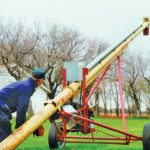
Tag Archives farm safety

Stay safe when working around grain
Using appropriate safety practices is vital as entrapment can happen very quickly
Injured on the farm? Farm Safety Program wants to know
Manitoba Farm Safety Program wants to hear about incidents so it can post preventive bulletins

Set an example for the younger generation during Ag Safety Week
Canada’s agricultural population is now made up of more farmers over age 70 than under 35

Keep your grandchildren safe on the farm
Grandparents are a vital building block in creating a family safety culture

Statistics show senior farmers need safer practices
An aging farm population and workforce bring new challenges

2018 farm safety week focuses on senior producers
Canadian Agricultural Safety Week will place special emphasis on keeping older workers safe on the farm

VIDEO: Full Bin Alarm wins Farm Safety Feature at Manitoba Ag Days
Invention lets producers on the ground know when their bin is full
Editorial: Let’s all stay safe at harvest-time

Flying hook nearly hits farmer
Wawanesa farmer warns others not to use a tow rope with hook to extract a stuck vehicle
Comment: Agriculture’s greatest innovation
Farms are still dangerous, but they’ve got a lot better over the years


